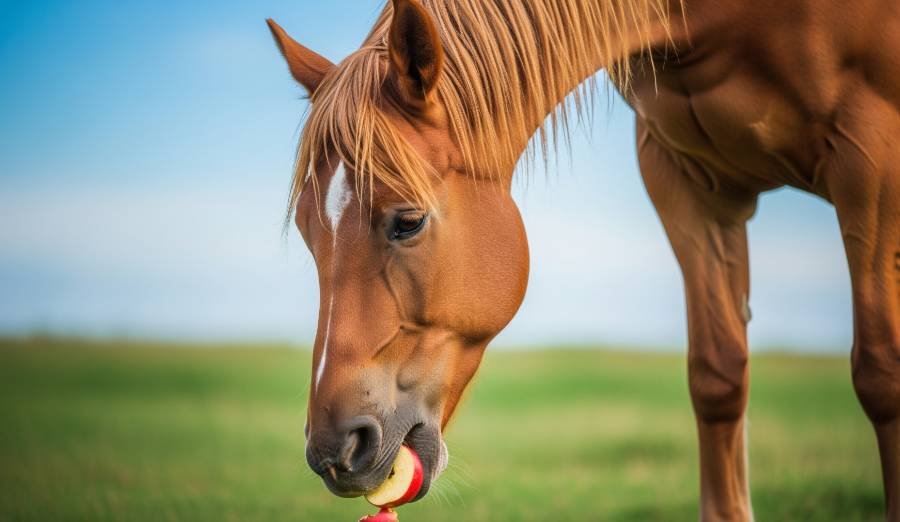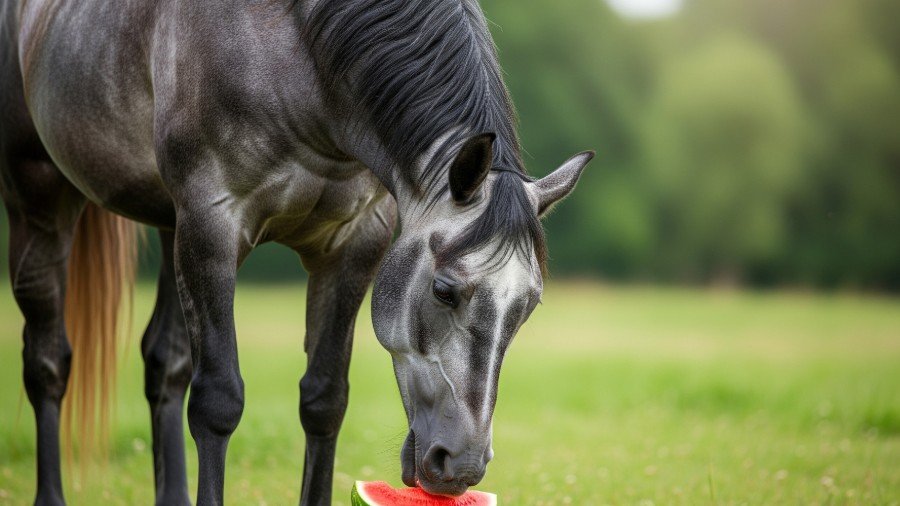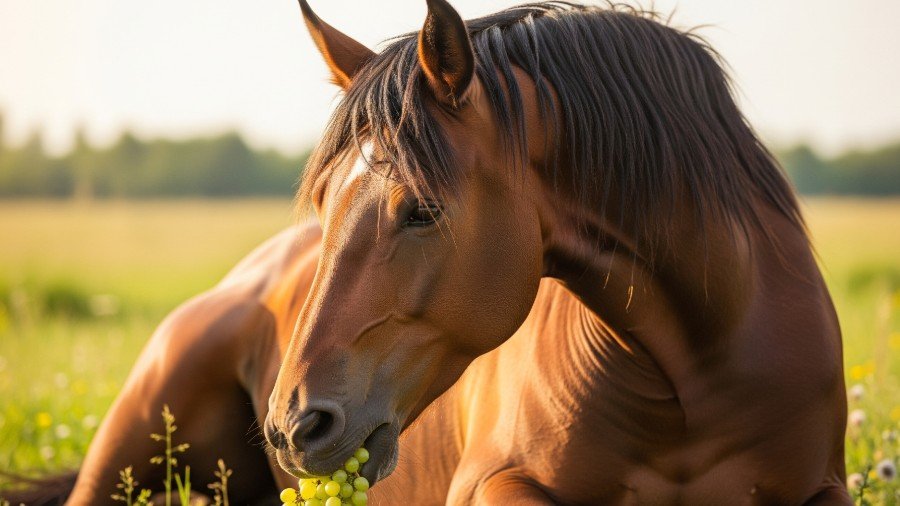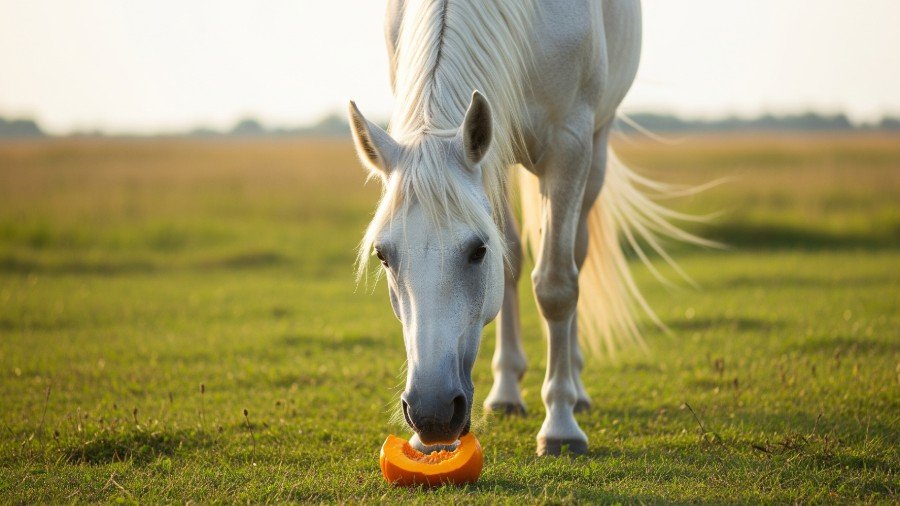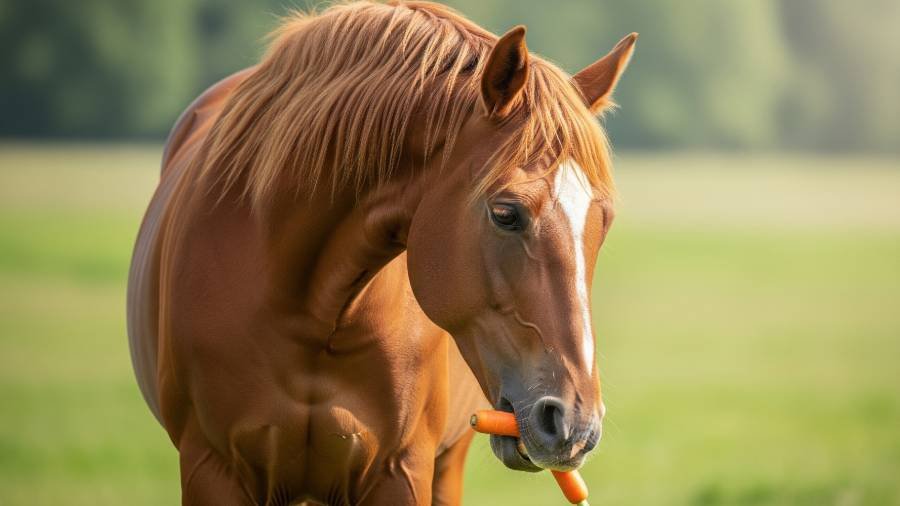Yes, horses can safely eat bananas as an occasional treat for horses, provided they are prepared properly and offered in moderation.
As part of a horse’s diet, bananas provide a natural sweetness that horses love, but they should complement their primary forage and grain intake.
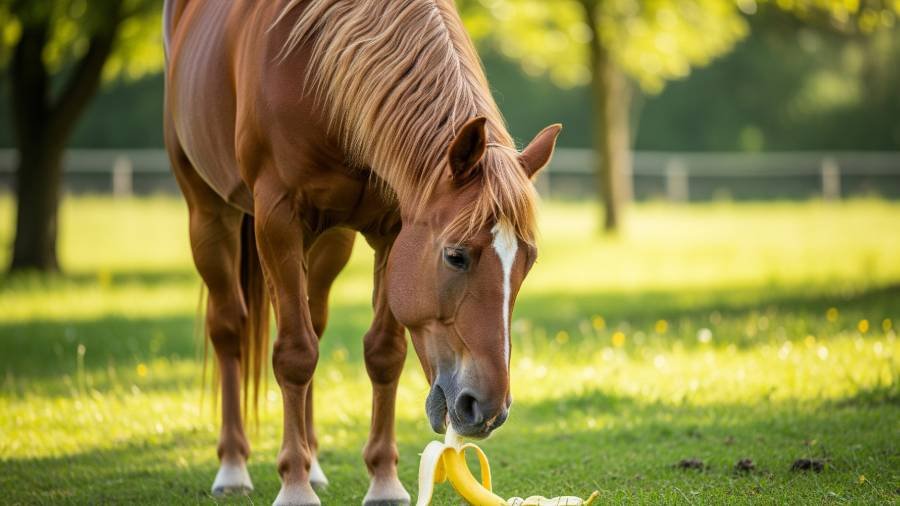
Potential Benefits of Bananas for Horses
When introducing bananas to a horse’s digestive system, they can offer several advantages that make them good for horses:
- Source of Potassium: Bananas are an excellent source of potassium, supporting muscle function and hydration.
- Vitamin B6: This nutrient aids in energy metabolism and overall health, making bananas a beneficial treat.
- Natural Sugars: The sweetness provides a quick energy boost, ideal for active horses.
- Fiber Content: Bananas offer mild fiber, promoting healthy digestion in a horse’s diet.
- Palatability: Many horses eat banana peels and flesh alike, enjoying the soft texture and taste.
These benefits are valuable when feeding bananas to horses in controlled amounts. For more on safe fruits, explore can horses eat apples.
Risks and Dangers of Bananas for Horses
While horses can safely eat bananas, some risks should be considered:
- Overfeeding: Excessive bananas can lead to sugar overload, potentially causing digestive upset or weight gain.
- Choking Hazard: Whole bananas or large pieces may pose a risk if a horse swallows without chewing properly.
- Pesticide Residue: Non-organic bananas may carry chemicals, requiring thorough washing to reduce the risk.
- Peel Concerns: Though horses eat banana peels, unripe or tough peels can be hard to digest.
- Allergic Reactions: Rare cases may show mild allergies, such as skin irritation, though this is uncommon.
- Nutritional Imbalance: Relying on bananas can dilute essential nutrients from a horse’s regular diet.
How to Safely Feed Bananas to Horses
To ensure bananas are a safe treat, follow these guidelines:
- Wash Thoroughly: Rinse bananas under water to remove pesticides, even if organic, before feeding your horse.
- Peel if Needed: Remove the peel for unripe bananas or if it’s tough, though horses can eat banana peels when ripe and soft.
- Cut into Small Pieces: Slice bananas into manageable chunks to avoid choking hazard and aid digestion.
- Feed in Moderation: Offer a small portion (e.g., half a banana or a few slices) once or twice a week, keeping treats under 10% of a horse’s daily intake.
- Avoid Additives: Serve plain bananas without sugar or spices, which can harm a horse’s digestive system.
- Monitor Reactions: Introduce bananas gradually and watch for digestive issues (e.g., colic, diarrhea) or allergies over 24–48 hours. Consult a vet if problems arise.
- Consult a Vet: Seek veterinary advice before feeding bananas, especially for horses with metabolic issues like laminitis.
Signs of Banana-Related Issues
If a horse eats too many bananas or reacts poorly, look for:
- Colic, diarrhea, or reduced appetite
- Excessive gas or bloating from digestive upset
- Lethargy or unusual behavior
- Skin irritation or swelling (rare allergic signs)
- Difficulty swallowing or choking (from large pieces)
If these signs appear, stop feeding bananas and contact a veterinarian immediately. Severe digestive issues require urgent care.
Expert Opinions
Veterinary sources, such as the Equine Nutrition and Health Service, confirm that horses can safely eat bananas in moderation, praising their potassium and vitamin B6 content. Experts advise peeling unripe bananas and limiting intake to avoid sugar-related risks. For more on safe produce, check can horses eat carrots or do horses eat pumpkins.
Additional Considerations
- Health Conditions: Horses with insulin resistance or laminitis should avoid bananas due to sugar content. Consult a vet first.
- Young Horses: Foals may need smaller portions and softer pieces, as advised by a vet.
- Horse Preferences: Some horses love the taste, while others may not. If uninterested, try alternatives like those in can horses eat strawberries.
- Organic vs. Non-Organic: Organic bananas may reduce pesticide exposure, but all should be washed.
- Dental Health: Soft bananas can be a gentle treat, though harder options might aid chewing more.
Safe Treat Alternatives
Instead of bananas, consider these safe-for-horses treats, tailored to enhance a horse’s diet and offering internal linking opportunities:
- Apples: Small, cored apple pieces provide vitamins and crunch. Learn more in our guide on can horses eat apples.
- Carrots: Sliced carrots offer beta-carotene and dental benefits. Check our guide on can horses eat carrots.
- Watermelon: Seedless, rind-free chunks hydrate and delight. Explore our article on can horses eat watermelon.
- Pumpkin: Cooked, plain pumpkin supports digestion. See our guide on do horses eat pumpkins.
Introduce new treats gradually, monitor for reactions, and consult a vet if unsure about safety.
Horses can eat bananas as a safe, nutritious treat for horses, offering benefits like potassium and vitamin B6 when fed in moderation.
However, risks such as choking hazard, digestive upset, or pesticide exposure require careful preparation and portion control. Horses with health issues or young ones should avoid bananas unless approved by a vet, and a balanced horse’s diet should remain the focus.
Always consult a veterinarian before introducing bananas or other fruits. For more on equine nutrition, explore can horses eat pears, can horses eat celery, or what do horses eat.
For additional questions about what horses can eat or nutrition, feel free to ask!
